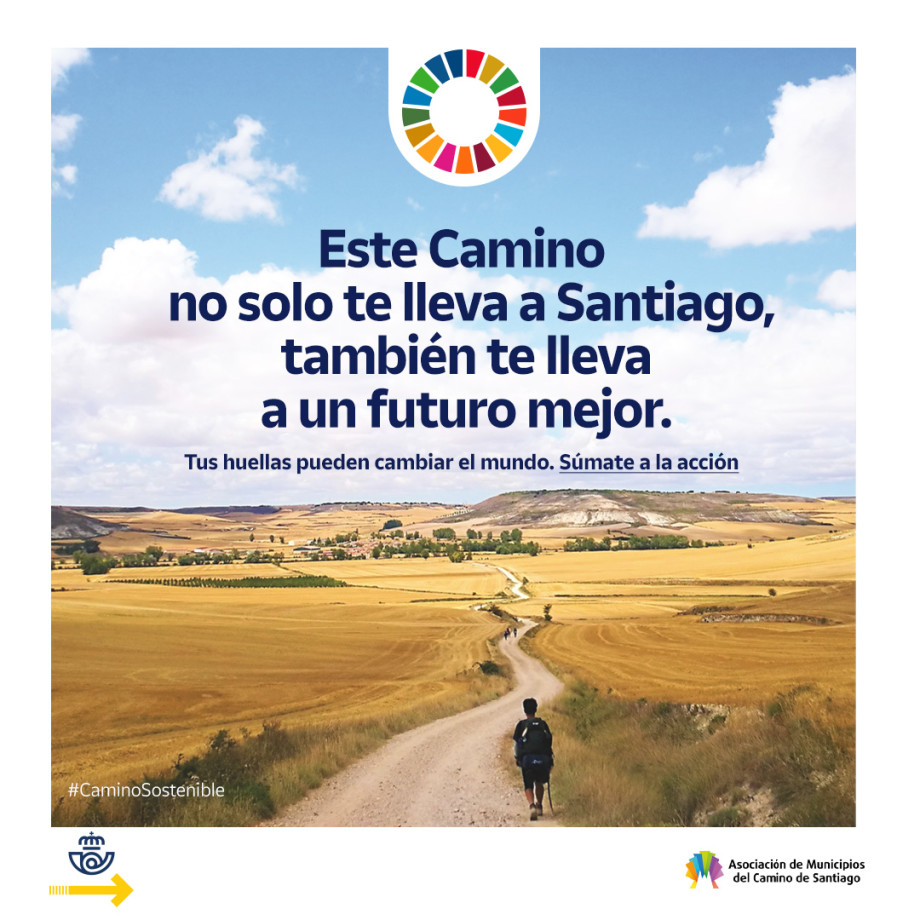
Publicize the Sustainable Development Goals, reflect on them and carry out small actions on the Camino de Santiago that contribute to their achievement.
With this triple objective, we continue with the #CaminoSostenible initiative, a Social Responsibility project of Correos that encourages pilgrims to reflect on their daily habits and change them for more sustainable ones from an environmental, heritage and human point of view, in tune with the objectives set by the United Nations in the 2030 Agenda.
The challenge: carry out small actions along the Camino de Santiago that help achieve a better future. Your footprints can change the world. Take the action!
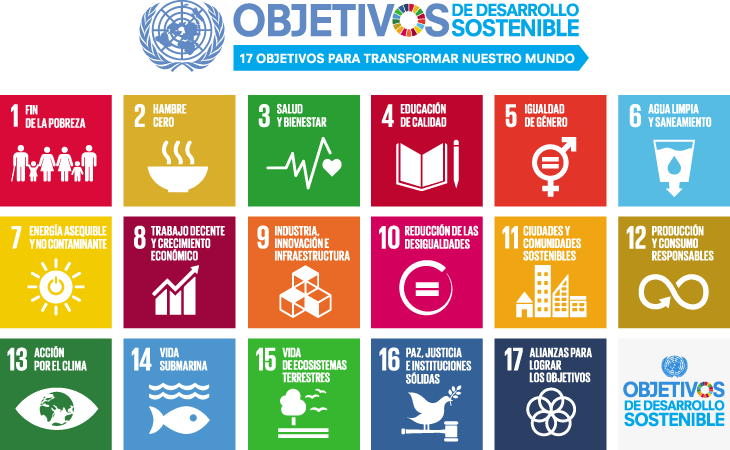
17 goals to change the world and a decade to act
What are the SDGs? They are the master plan designed by the UN to achieve a sustainable future for all before 2030, addressing different aspects such as poverty, inequality, climate, environmental degradation, prosperity, peace or justice.
The SDGs are not an abstract concept, but rather contain specific goals to which everyone – administrations, companies and each one of us – can contribute in our day-to-day lives. We are talking about a total of 17 objectives, divided into 169 goals, enacted in 2015 with the purpose that countries and their societies improve their lives, leaving no one behind.
With 2030 on the horizon, it's time to take the action. The UN warning is clear: we are not doing everything possible to meet the objectives within the established period. Therefore, joining efforts is more important than ever during this "decade of action": 10 years in which each of us must act, both individually and collectively, locally and globally.
The Camino de Santiago and the SGDs
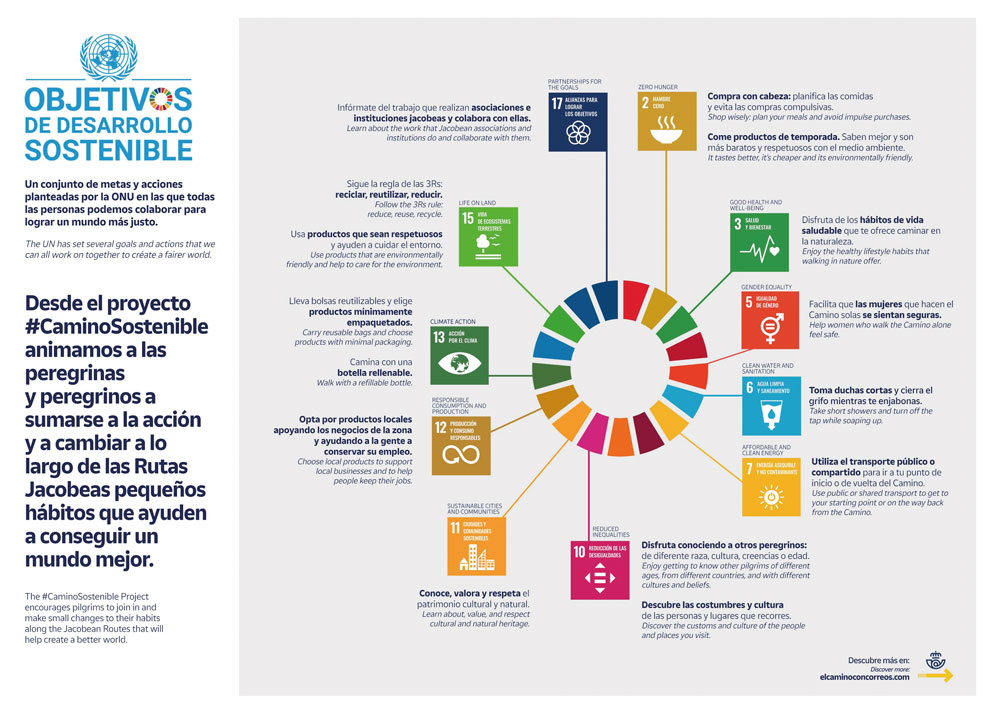
Reaching 2030 with homework done is everyone's business and in all areas. On the Camino de Santiago we can also collaborate in achieving some objectives and goals.
For this reason, at Correos we want to invite you to reflect on it and take the action. How? Knowing the SDGs, changing our day-to-day habits and carrying out small actions along our Camino that help change the world.
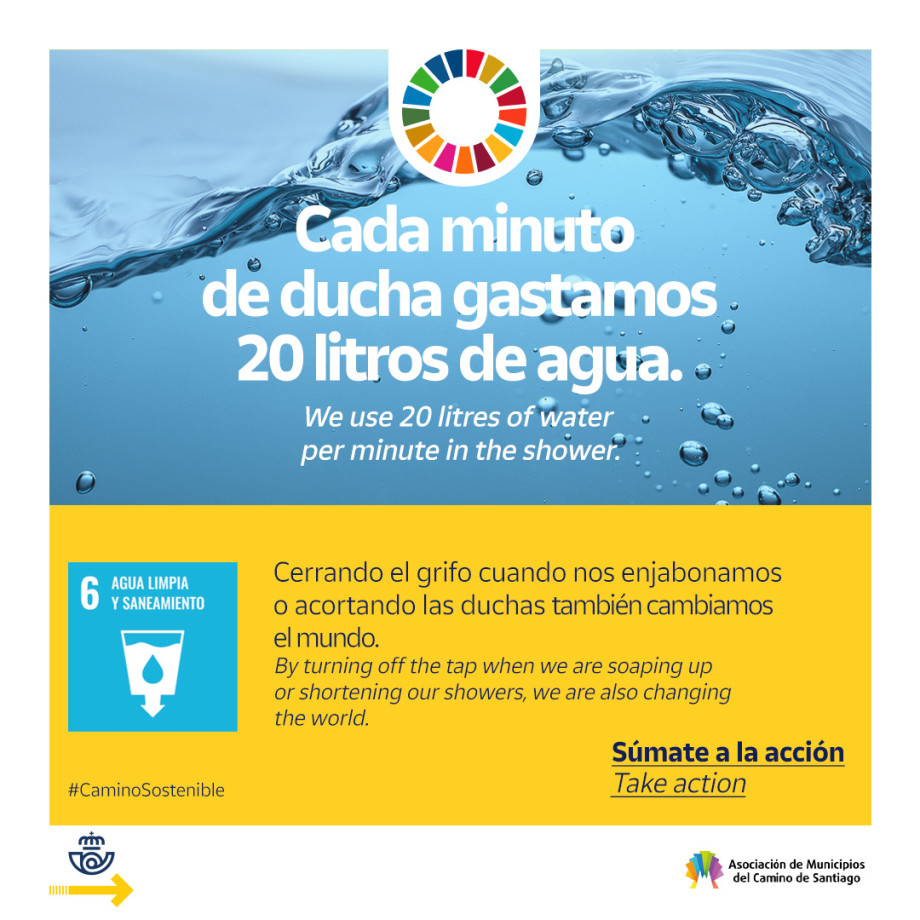
Water scarcity affects more than 40% of the world's population and this percentage is expected to increase. That is why SDG 6 is dedicated to Clean Water and Sanitation. It is up to us to be responsible and make efficient use of this resource. While we are pilgrims, too.
Did you know that for every minute of showering we use 20 liters of water? Reducing the time in the shower or turning off the tap while you lather are some of the small gestures with which we can contribute to achieving this goal.
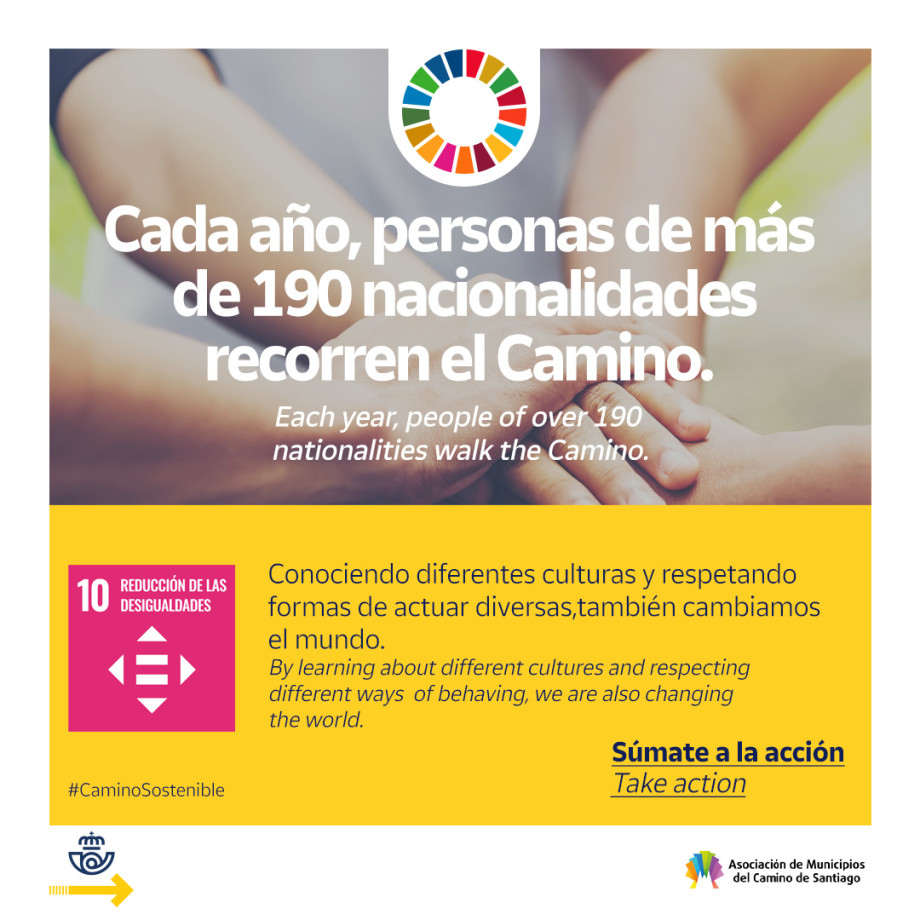
Without equality and without inclusion, there is no sustainability. Inequalities -whether of origin, gender, sex, race, age, sexual orientation, class or religion- are a major obstacle to the sustainability of the planet. Knowing other cultures, learning to respect other ways of life different from yours or overcoming stereotypes are small actions with which we can begin to break down these barriers.
The Camino de Santiago is the perfect setting to demonstrate that equality is possible. People of more than 190 nationalities, different sexes, ethnic groups and religions travel the same routes every year, live in the same hostels, walk in their own footsteps. The Camino equalizes us. And it makes it possible to meet people from all over the world, get to know different cultures and discover new ways of life. Seize it!
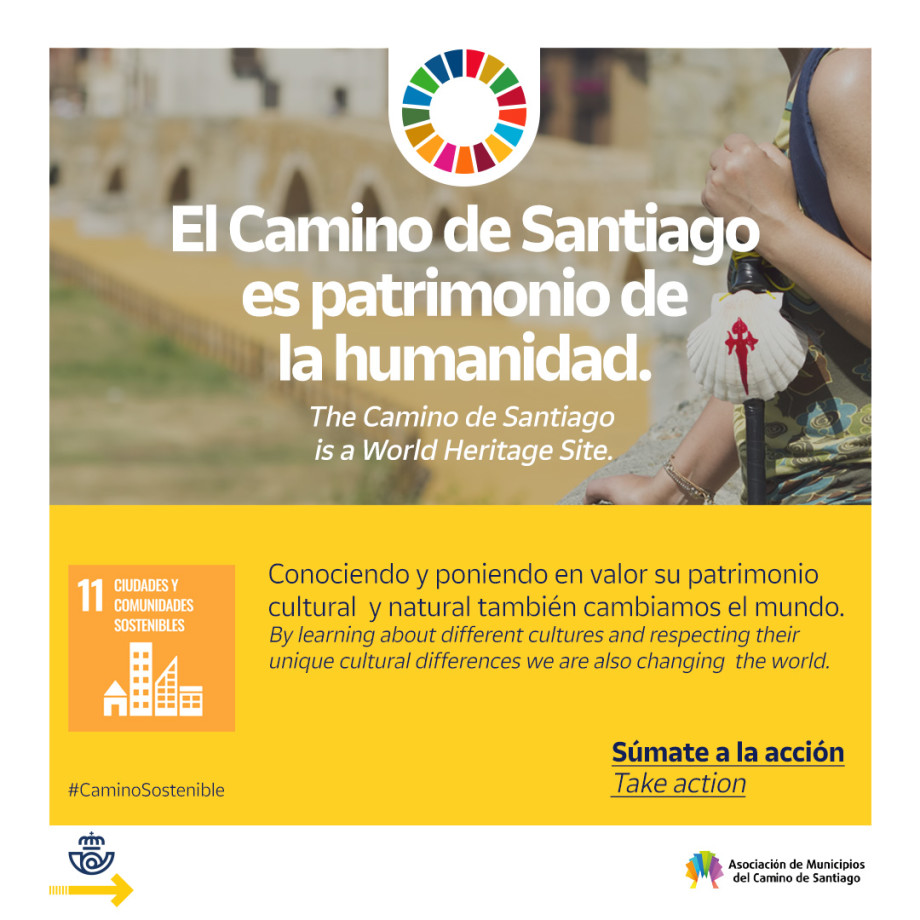
When we talk about sustainability we are not only referring to the environment or people, but also to our artistic heritage. The loss of local cultures implies a serious loss of a secular memory and tradition, of a way of life, which will lead to serious human and economic inequalities.
The Camino de Santiago is a World Heritage Site for its artistic, but also human and natural wealth. So take advantage and soak up it. Do not hesitate to visit the places that make up the Camino, help spread its wealth and fight to prevent its disappearance.
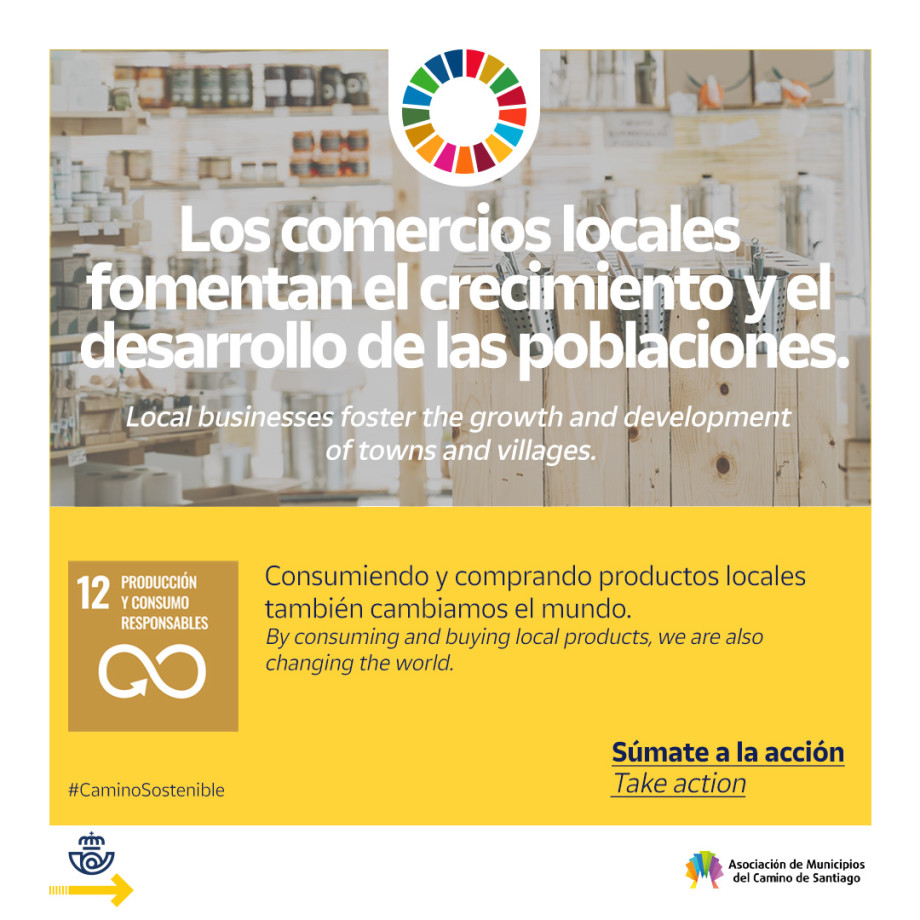
If everyone consumed at the rate we do in Spain, it would be necessary to have two planets to produce the necessary resources. This pace is not only unsustainable, but also predatory and unworkable. For this reason, it is time to bet on responsible consumption, which is respectful of the environment but also in solidarity with all the territories and people on the planet.
During our Camino de Santiago we can bet on consuming seasonal and local products, with which we will help reduce the ecological footprint; in addition to betting on the shops and small businesses in the areas we pass through. We will contribute to the growth and development of the areas in which they settle, helping in the fight against depopulation.
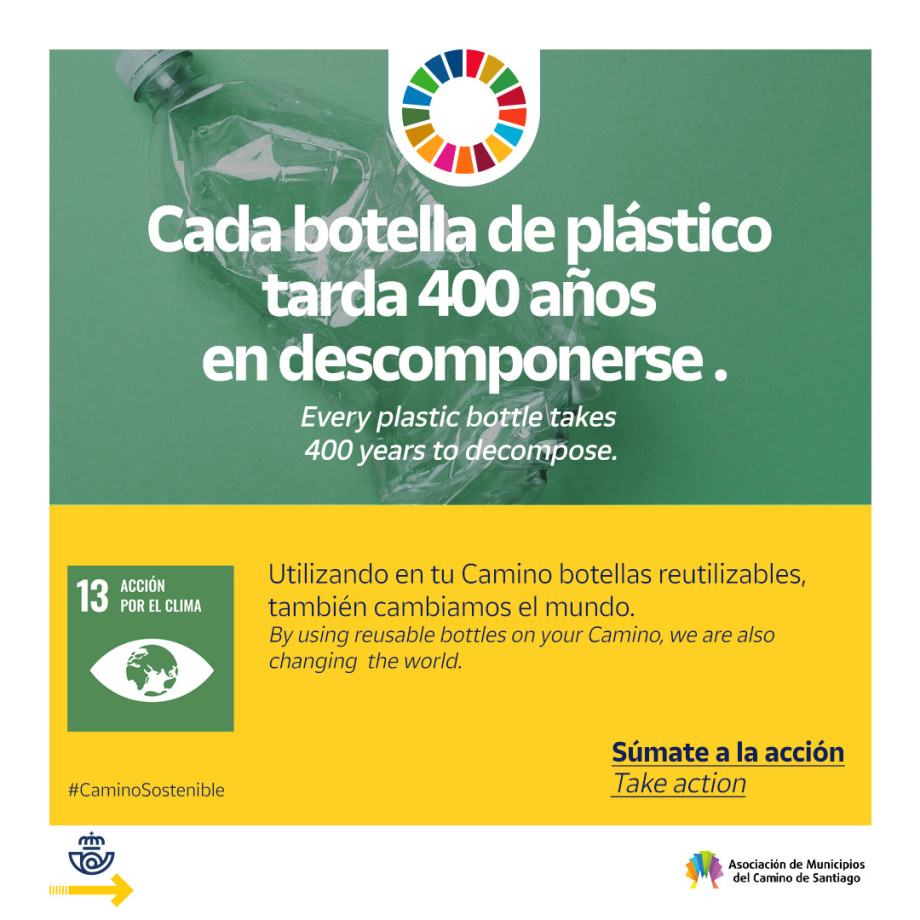
Climate change is a reality that threatens our way of life and the future of the planet. The increase in global temperature, the rise in sea level or adverse weather events are a reality.
Governments and large companies have a lot of responsibility when it comes to curbing this situation. But each of us can also help mitigate climate change. Betting on waste reduction and recycling is one of them and during our Camino de Santiago we can make small gestures that prove it. Did you know that each plastic bottle takes 400 years to decompose? During your pilgrimage, don't hesitate to bet on reusable bottles, which you can refill along the Route.
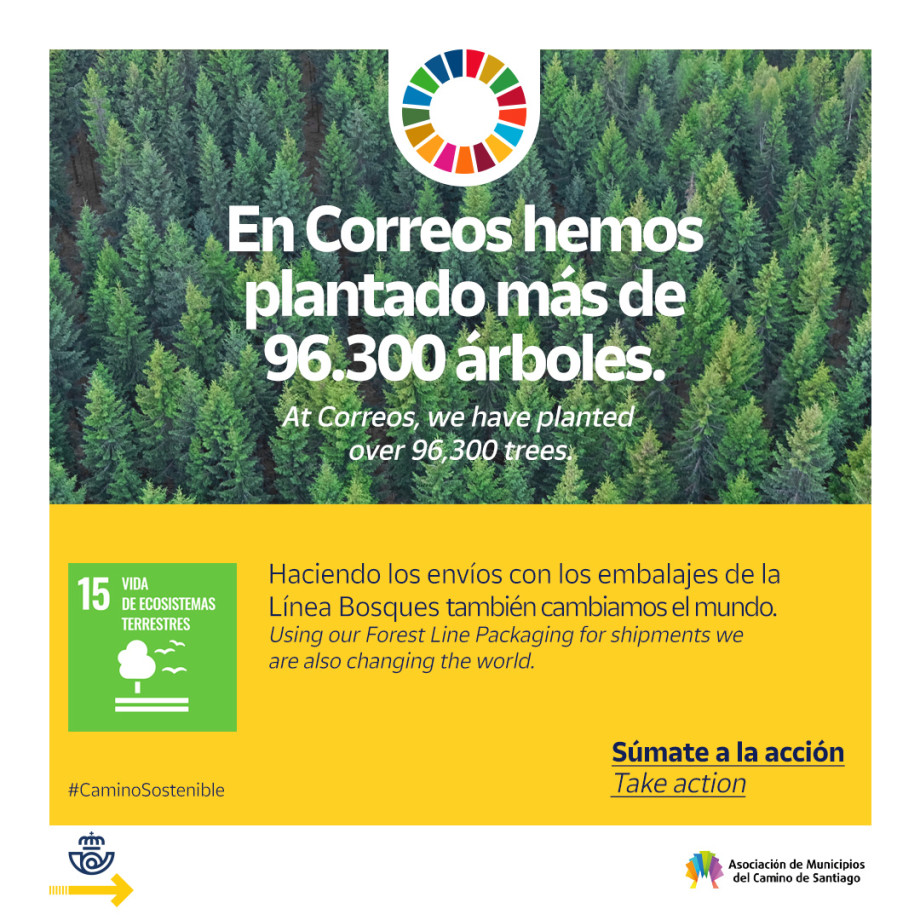
When we talk about preserving our natural wealth, as fundamental as protection and conservation is the recovery of ecosystems.
At Correos we know its importance and, for this reason, since 2000 we have carried out reforestation and recovery actions for degraded spaces in different areas of Spain. In total, 21 Correos Forests, more than 102,500 trees of native species, in an area of 253 hectares distributed throughout the national territory.
Thanks to the Forest Line (Línea Bosques), every time you send your bike with the Paq Bicicleta or a package or a staff pilgrim with the Paq Peregrino you collaborate in reforestation, fire prevention and biodiversity preservation projects.
Correos' environmental commitment materializes in the most sustainable manufacturing of packaging. The boxes in which the shipments are made are made with materials that respect the environment and are carbon neutral: they are made of 100% recycled, compostable, biodegradable cardboard and non-toxic, water-based inks are applied to them, thus avoiding the contamination during use and recycling. In addition, they have the FSC certificate.
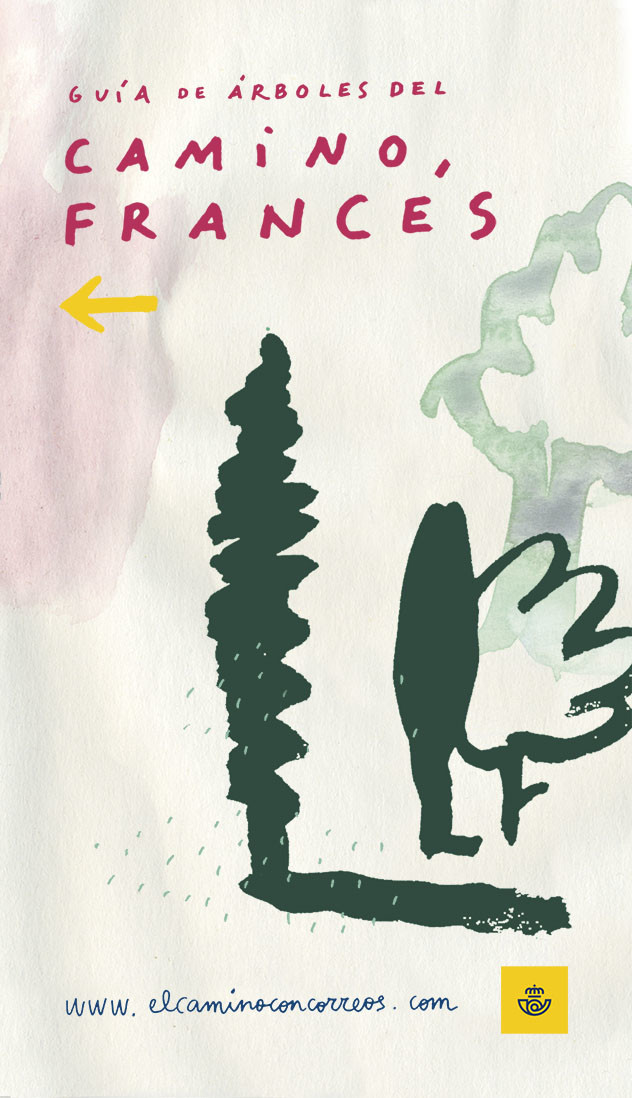
Along with protection and regeneration, diffusion is another of the key actions in the conservation of ecosystems. Because as we already know, only what is known is protected. To do this, pilgrims have the Tree Guide of the French Way, an illustrated journey along the Jacobean Route through its most outstanding species.
Thanks to this guide, the pilgrim will discover the most typical trees of each area that the Route crosses: 16 easily recognizable species, with the specific places where they can be found. The guide also has a small card with its physical characteristics, which will help you identify the tree, as well as some notes that refer to the uses and traditions of each species.
The Tree Guide of the French Way, made in collaboration with Amigos da Terra and illustrated by the artist María Meijide, can be obtained free of charge at Post Offices in Jaca, Burguete, Pamplona, Logroño, Burgos, León, Ponferrada, Sarria and Santiago de Compostela.
Our actions can go much further and contribute individually and from the Camino de Santiago with all the Sustainable Development Goals.
We count on you to share your own advice, actions and opinions to achieve sustainability on the Camino de Santiago. Use the hashtag #CaminoSostenible to get, together, to get this message to the maximum number of people possible.

